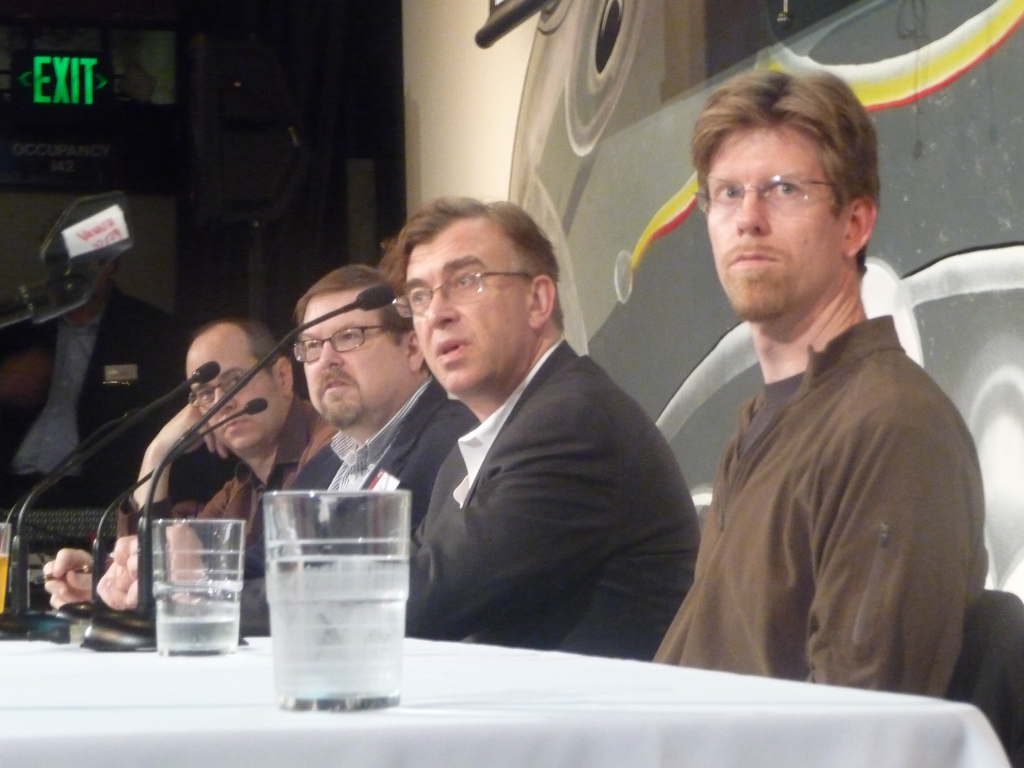
A couple of weeks ago I took part in a discussion about press embargoes, with Tom Foremski, Damon Darlin and Mark Glaser, skillfully moderated by Sam Whitmore. Also in the audience, and contributing worthy comments, were Rafe Needleman, Paul Boutin, and other members of the press and PR corps.
I kicked things off (and got a cheap laugh) with the comment that I thought the word “embargo” derived from a Latin phrase meaning “Fuck you.” It was a joke, but I meant it, in a way: I don’t like embargoes, and when I agree to one it’s because I realize the value of the news to my readers outweighs the value of the independence I would retain by saying no. In other words, the PR person has me over a barrel, and she knows it. If I want the news, I have to agree to the terms — terms which include tying my hands.
What’s more annoying, I’ve had several cases recently at Wired.com where we were put at a serious disadvantage by embargoes that we’d agreed to, in good faith. Either through machinations by the PR firm, cluelessness on the part of their clients, or ruthlessness on the part of other journalists, the news got leaked — early — by other news outlets, leaving Wired high and dry. This has happened more in the past year than in the whole previous decade, leading me to think that yes, there is something of a crisis here.
It’s this awkwardness, bad faith, and outright attempt to control the press that makes many journalists, including Glaser, feel that we should just refuse to accept embargoes. Indeed, some news outlets, if they have enough clout, can get away with this as a general policy: the Wall Street Journal is the shining example.
But most news outlets aren’t in that position, and most journalists aren’t likely to be able to refuse embargoes long for a simple reason: In product-driven journalism and indeed in much business journalism, PR people hold most of the cards, during the news announcement cycle anyway. (Product reviews, analyses and more scoopy stories are a different matter.) If you want the news, there’s only one source: The company that’s making it.
Besides, as I asked that night, what journalist would ever refuse an exclusive? What about an exclusive offered only to you, the New York Times, and the WSJ? What about an exclusive offered to you and just 25 other news outlets? In the last case, it’s not totally exclusive, but the news is still worth something — and it’s something that hundreds of other journalists and bloggers don’t have. So in other words, the embargo is on a continuum with exclusives, making it unavoidable.
This even though embargoed stories are almost never our biggest ones. The big stories — those that garner huge pageviews — are almost always the ones where we’ve done original reporting, broken a new story on our own, provided unique analysis, or delivered perspectives you couldn’t get elsewhere. But the embargoed stories are the ones the readers (and the boss) would miss, if you didn’t cover them, so you have to cover them, even if you know they’re not likely to be hits.
That said, I recognize that embargoes are a fact of life in my field and I take a pragmatic, and I hope honorable, approach to them. My rules are simple:
- If I agree to an embargo, it has to have a specific expiration date and time (with the time zone specified).
- Once I agree to an embargo, I will honor its terms.
- If a few details are leaked by other sources, I will report on those leaks without recourse to the embargoed information I may hold.
- But if the whole story breaks early somewhere else, it’s fair game: The embargo is off.
- And if the PR person values their relationship with me and with Wired, they will call me as soon as possible to let me know that the news has broken and that I’m free of the embargo.
Also, and this bears repeating: It comes down to trust. I think the reason that embargoes have gotten such a bad rap in the past year or two is that both journalists and PR people are struggling with massive upheavals in the way news is published and distributed. There’s a lot of turnover. Everyone is overworked. As a result, there are fewer of the personal, human-to-human connections between flacks and hacks that used to make the embargo system (and indeed, the whole PR-press relationship) work. So mistakes get made, either by naive or unprincipled journalists, or by new and untrained PR people, or by either one, when someone figures that the value of the news opportunity exceeds the value of the (nonexistent) relationship.
So really, I’m much more likely to agree to an embargo if I know you and have worked with you before and I trust you. And likewise, you’re much more likely to offer me an embargo if you know and trust me.
More coverage of the embargo panel (the stories I could find, anyway):
Internetnews.com: Tech Reporters Talk Tough (David Needle)
Bay Newser: Hacks and Flacks Talks Embargoes (E.B. Boyd of MediaBistro)
To Embargo or Not to Embargo (Bobbie Peyton, Burson-Marsteller)
Persuasive Marketing: Is It Time to Place an Embargo on PR Embargoes? (Robert Mullins)
The Future of the Embargo (Brian Solis)
The Death of the Embargo: We Won’t Care (Stowe Boyd)
And it looks like Waggener-Edstrom, which hosted the event, has posted video of the Embargo 2010 discussion. It’s about an hour long.
Also, see my earlier post: Journalism and PR in the new media age.
